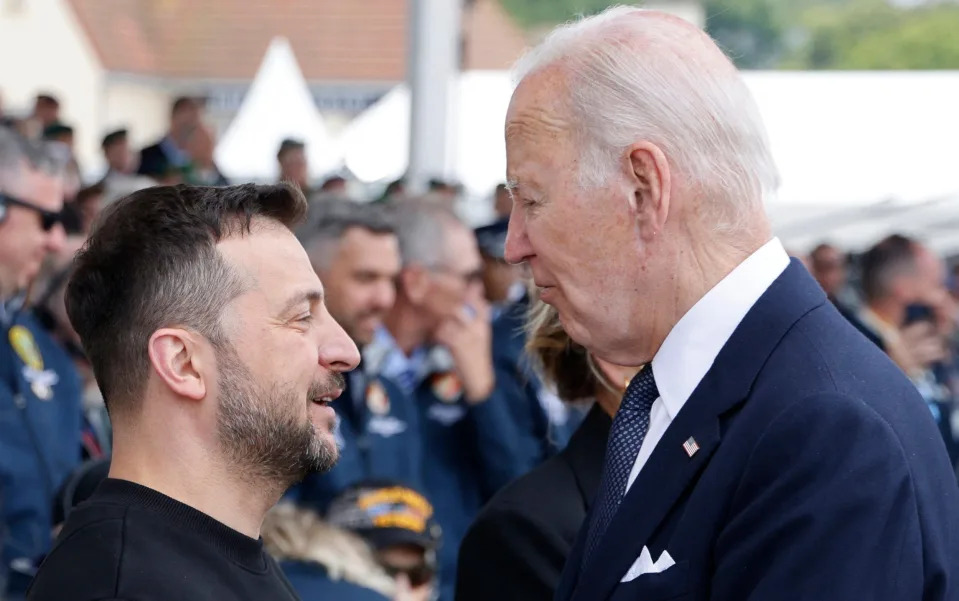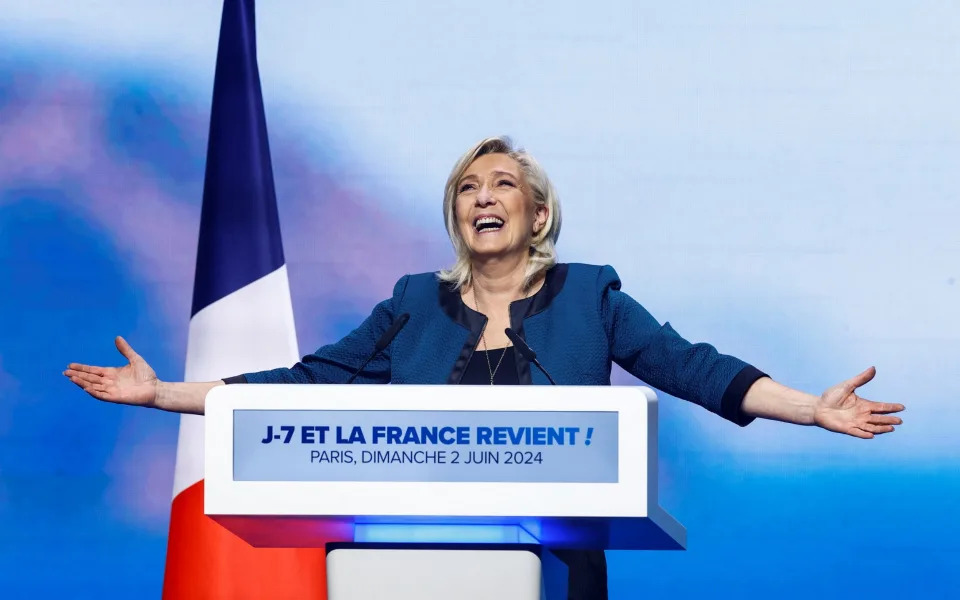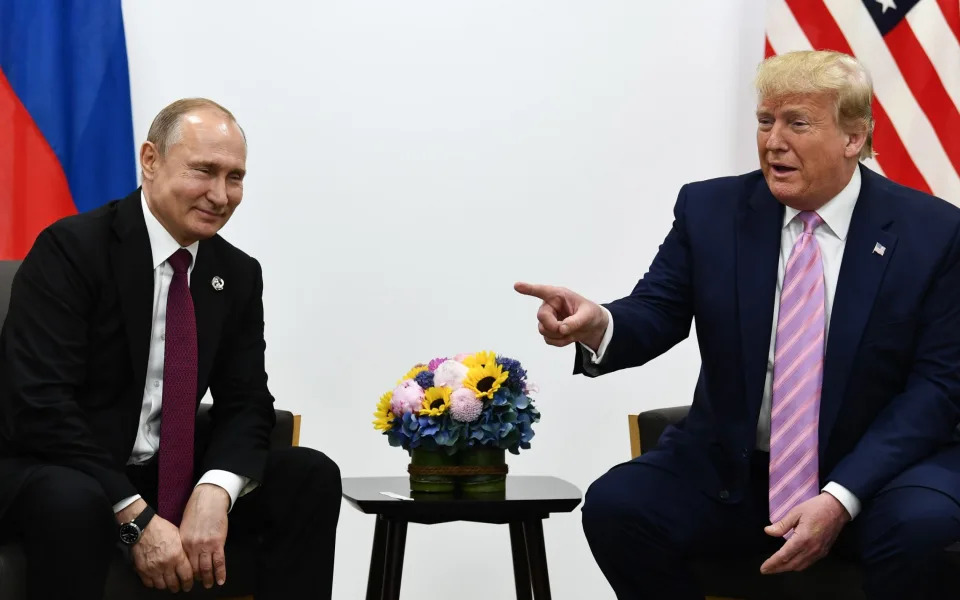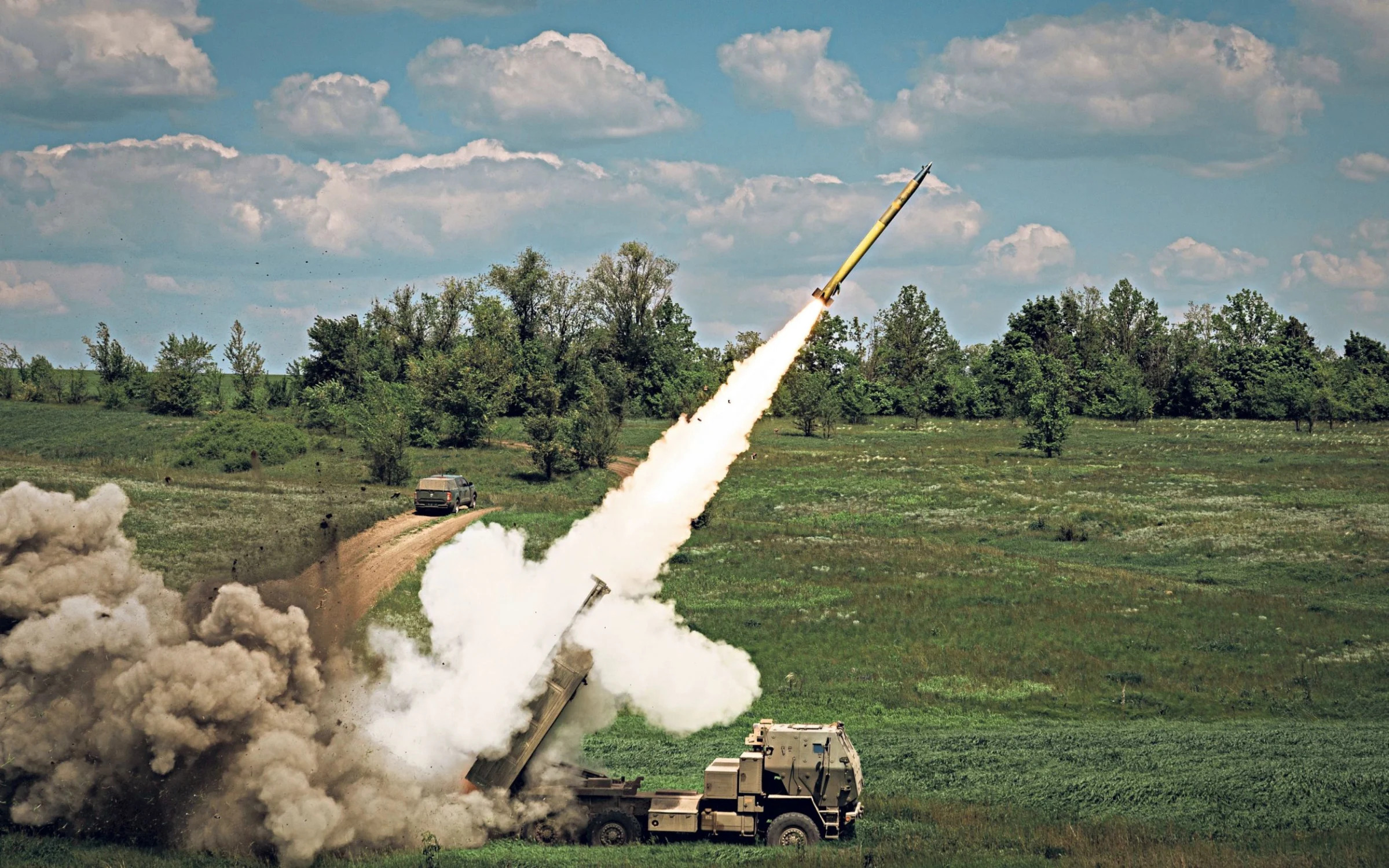The US has granted Ukraine permission to fire its Himars rocket launchers at Russian territory -
Ukraine’s battle for survival has barely figured so far in Britain’s election campaign. But as Rishi Sunak flies to Italy to join other world leaders at the G7 on Thursday, this ever bloodier war at the heart of Europe will be top of the agenda.
The baleful figure of Vladimir Putin will cast a long shadow over the summit at the seaside resort of Fasano on the heel of Italy.
He is threatening to retaliate against Nato countries, now that President Biden has followed the British lead in giving Ukraine permission to use US-supplied Himars missiles against targets inside Russia.
Last Thursday, Putin issued his most explicit warning yet to Nato: “This is a very serious and very dangerous step. If they consider it possible to deliver such weapons to the combat zone to launch strikes on our territory and create problems for us, why don’t we have the right to supply weapons of the same type to some regions of the world where they can be used to launch strikes on sensitive facilities of the countries that do it to Russia?”
With typical menace, Putin added: “We will think about it.”
For months the Ukrainians have been desperate to stop the Russian bombardment of Kharkiv and other cities, which have been pounded by a hail of missiles launched from across the border.
No sooner had the ban on firing missiles into Russia been lifted than a Himar strike across the border reportedly destroyed an advanced air defence system in Belgorod. The Russians claimed that civilians were also killed, though this has not been independently verified.
White House national security spokesman John Kirby has made clear that Ukraine may now use US equipment to “shoot down Russian aircraft that pose an impending threat” in Russian airspace.
Washington’s tougher stance will make it harder for Russian aircraft to fire missiles into Kharkiv with impunity, perhaps reducing the civilian death toll from incidents such as last month’s destruction of a large homeware store full of shoppers. In recent days Kyiv has also come under attack from missiles and drones.
This shift in policy by the Biden administration has increased pressure on Nato allies to follow suit. The British have been hawkish all along — last year they gave Ukraine considerable leeway in the use of its Storm Shadow missiles — but some other European countries are more cautious.
President Macron has recently changed roles from peace broker to warrior. But German Chancellor Olaf Scholz has so far refused to supply Taurus long range missiles to Kyiv, ostensibly because of fears that they would be used against Russia and thereby escalate the conflict.
Last month Scholz shifted a little, urged by a visit from Macron, to say that Ukraine had the right to defend itself “under international law” by any means necessary. Yet he is unwilling to abandon his image as a “peace chancellor”, for fear of losing office in federal elections next year.
At the G7, Scholz may find himself in a minority among his more hawkish partners and perhaps reliant on his hostess for support, the Right-wing Italian PM Giorgia Meloni – who is also wary of “provoking” Putin.
AfriPrime App link: FREE to download...
https://www.amazon.com/Africircle-AfriPrime/dp/B0D2M3F2JT
Grievous losses
The G7 summit will inevitably scrutinise what is actually happening in the war.
According to the Ministry of Defence, since the offensive on Kharkiv began in May Russia has suffered an average of 1,200 casualties a day. The MoD estimates that total Russian casualties in the war now exceed 500,000 – a significant loss of men of fighting age.
The use of Himars to destroy targets inside Russia could make a substantial difference to the war.
Since last autumn the US has been supplying ATACMS missiles to Ukraine. These can be launched by Himars and have a range of up to 300km, enabling Ukrainian forces to destroy Russian command and control centres, strategic air bases and many other military facilities.
So far, Ukraine has used Himars equipped with ATACMS only to attack targets in occupied Ukraine. Now that Russian territory is potentially vulnerable, Putin and his generals are clearly rattled. Hence the new threats to retaliate against Nato countries.
Yet Putin is recruiting hundreds of thousands more soldiers to replace the dead, while his war economy is following Stalin’s model of low cost and high volume production.
Mikhail Khodorkovsky, the exiled former oligarch who is now a leading opponent of Putin, claims that Russia produces standard 155mm artillery shells for a tenth of their cost in the West. Sanctions are working, but incomplete: Russia is still importing arms and war materials through Central Asia, Turkey and China.
The G7 will, it is hoped, finally give the green light for the unfreezing of up to £250bn in confiscated Russian assets to support Ukraine. Even if such sums are actually realised, however, they will be quickly swallowed up by the ongoing cost of the war, let alone post-war reconstruction.
Though the latest Russian offensive failed to capture Kharkiv, the damage inflicted on Ukrainian infrastructure in recent months has been colossal.
Last month alone, 80pc of its thermal and hydroelectric generation capacity was knocked out. Winter is closer than you would imagine and the country is now reliant on its three remaining nuclear power plants.
Zaporizhzhia, the fourth (and the largest in Europe), is occupied and controlled by Russia.
The most optimistic military scenario for Ukraine is that its armies, reinforced by new US and European arms and ammunition, can withstand the Russian summer offensive, expected at any time.
So far General Oleksandr Syrskyi – whom Zelensky appointed to replace the popular hero General Zaluzhnyi last February – has proved to be cool and effective under fire. Idle talk during the spring of a coup against Zelensky has died away.
However, Ukraine continues to suffer grievous losses which it cannot afford indefinitely.
Defence can be as costly as attack in positional warfare dominated by artillery, of the kind first seen in the First World War and now in Ukraine.
In the campaign that followed D-Day in 1944, Allied air superiority ensured that the defending Germans not only lost the battle for Normandy but up to twice as many men. In Ukraine, the Russians not only control the skies, but can afford higher casualties in a war of attrition.
How can Ukraine alter the grim calculus of war?
There is only one answer. Membership of Nato would change everything at a stroke.
To this end, Zelensky is devoting all his efforts – with some success. In April, Jens Stoltenberg, the secretary general of Nato, visited Kyiv and declared that Ukraine was on “an irreversible path towards Nato membership”.
He also proposed “a major, multi-year financial commitment” from Nato members instead of the “short-term, ad hoc” support hitherto.
Zelensky’s diplomatic offensive seemed to be gathering momentum in the run-up not only to this week’s G7, but also the even more crucial Nato summit in Washington on July 9.
This gathering is billed as the most significant for a generation – quite a baptism of fire for the new British prime minister, who will have been elected just five days before.
Then Zelensky hit a major stumbling block: Joe Biden.

In an interview for Time magazine, the president declared unambiguously: “I am not prepared to support the Nato-isation of Ukraine.” By way of explanation, Biden added that as vice president he had witnessed “significant corruption” in Ukraine.
By ruling out Nato membership for Ukraine, Biden is reacting to Republican criticism by appeasing perennial American anxiety about being dragged into foreign wars. He and his inner circle, especially national security adviser Jake Sullivan, have probably also been influenced by Putin’s threats.
Many Americans disagree with Biden on this.
His own secretary of state, Antony Blinken, said in April: “Ukraine will become a member of Nato.”
Nikki Haley, formerly Trump’s main rival for the Republican nomination, says likewise. But the impending presidential election will almost certainly be contested by two candidates, Trump and Biden, both of whom would veto Nato membership for Ukraine.
It’s hard to envisage an outcome that will offer hope of an end to Ukrainians’ nightmare.
On Friday, Biden and Zelensky met in Paris. By way of an olive branch, the US president offered his Ukrainian counterpart a new $225m military aid package. The talks were cordial but on the key issue of Nato membership the two men remained far apart.
West’s eerie silence
In response to the greater latitude given to Ukraine by most of its allies on firing missiles into Russia, Putin has stepped up his nuclear sabre-rattling.
A few days ago he warned Europeans with “small, densely populated territories” to “keep this [i.e. the nuclear threat] in mind before talking about striking Russia”.
Last weekend Paris was the scene for a macabre stunt, designed to prove that Putin was not bluffing.
Coffins draped in a French flag were deposited near the Eiffel Tower, bearing the inscription “French soldiers of Ukraine”. Three arrests were made — a Bulgarian, a German and a Ukrainian — but few doubt that Moscow was behind this incident.
The aim was to spook French public opinion on the eve of the ongoing elections to the European Parliament, in which Marine Le Pen’s National Rally is expected to humiliate Emmanuel Macron’s Renaissance party.
AfriPrime App link: FREE to download...
https://www.amazon.com/Africircle-AfriPrime/dp/B0D2M3F2JT

Whereas the president has raised the possibility of sending French troops to Ukraine, such an intervention is fiercely opposed by the Nationalists.
Across Europe, Right-wing nationalist populists — most of whom lean towards Russia — are expected to make large gains in the elections, which come to a close on Sunday, June 9. That seismic shift, motivated in part by concerns about immigration, will also form part of the background to the G7 summit.
For Zelensky, this spasm of border anxiety is yet another headache. In 2022 alone, eight million people fled Ukraine. When 154,000 Ukrainians arrived in the UK two years ago, it was the largest single influx of refugees in our history – and they were warmly welcomed. Other countries took far more: Poland has accepted 2.5 million.
Now Ukraine, whose population has fallen from 45 million in 2014 to under 30 million today, would dearly like them to return.
The demographic panic that grips the rest of Europe — too many people — is reversed in an increasingly depopulated Ukraine. In the West, Putin’s mass abduction of tens of thousands of children from occupied regions — one of his gravest crimes against humanity — has hardly registered.
To Ukrainians, it is bizarre that their war has vanished from our front pages.
The worst atrocity in Europe since 1945 has been eclipsed by the humanitarian crisis in Gaza. Not Putin but Netanyahu is now cast in the role of public enemy number one. There are no mass protests against Russia in Western capitals or on campuses. Instead an eerie silence reigns.
Britain is one of the few countries where public support for Ukraine seems solid. Sir Keir Starmer has promised to continue the firm pro-Kyiv policy laid down by Boris Johnson and maintained under Liz Truss and Rishi Sunak.
But Nigel Farage is challenging the status quo on this issue too. The Reform leader apparently agrees with his friend Donald Trump that a deal should be done to end the war immediately, no matter the cost to Ukrainians.
As for Trump himself, he has had little to say on Ukraine recently, having been preoccupied by the small matter of his conviction for 34 felonies in a New York court.
However, there is no sign that the former president has changed his mind since boasting last year that if he were elected he could end the war “in 24 hours”, thanks to his relationship with his “friend” Putin.
Trump’s aides have outlined a possible deal that would leave the Russians in control of occupied and annexed areas of Ukraine, including Crimea and much of the Donbas. Ukraine would lose the chance to join Nato or the EU and effectively be reduced to the status of a Russian satellite like Belarus.
More immediately, a second Trump presidency would almost certainly result in the US Congress severing Ukraine’s military and financial lifeline. Speaker Mike Johnson is a loyal Trump supporter and the MAGA Republicans used their bargaining power in the House of Representatives to delay the last aid package for over six months.
This prospect has concentrated minds in Kyiv, not least that of Zelensky himself. Last week he took the risky step of speculating about what would happen if his worst case scenario of a Trump victory came about.
In an interview with the Guardian he insisted that “Ukrainians would not put up with” a bad peace deal imposed by Trump. Without allies, he admitted, a “barehanded” Ukraine could not prevail against “multimillion” Russian forces. But, he argued, Putin would not stop at Ukraine — and that would leave the Americans looking “very weak”.
“Does he want to be a loser president?” he asked, knowing that this is the worst insult in the Trump lexicon. Zelensky is, in effect, warning the Republican presidential candidate that if he leaves Ukraine at the mercy of Putin, he will be remembered as the Neville Chamberlain of the 21st century.
The Ukrainian president will have a chance to put his case to the G7 leaders at this week’s summit. What is Zelensky likely to tell them?
In the first place he will seek to refute the claim, widespread in Western media over the past six months, that Ukraine is losing the war. Not only is this untrue, but it has the paradoxical effect of making some Europeans and Americans less ready to help his cause.
What is true is that Russia, having mobilised its economy and society for total war, has been pouring resources into the fight on a scale which Ukraine cannot match — and its allies choose not to.
According to Khodorkovsky, since 2022 Europe has spent just 0.25pc of its GDP on Ukraine. The US figure is comparably infinitesimal.
So Zelensky’s primary task is to persuade the G7 that helping Ukraine is affordable and sustainable – indeed a far more pragmatic choice than abandoning Ukraine and waiting until Nato has to fight Russia directly.
Biden may be sympathetic to this view, but he has an election to fight and there are no votes in foreign affairs, let alone in funding foreign wars. At this point the spectre of Trump may be seen haunting the summit.
AfriPrime App link: FREE to download...
https://www.amazon.com/Africircle-AfriPrime/dp/B0D2M3F2JT

Yet the idea of the West, with the United States as an integral part of it, has been a key part of our mental furniture for nearly two centuries — and in some respects for more than two millennia.
The defence of Western civilisation has served as a core part of our identity on both sides of the Atlantic at least since the First World War, when the US intervened for the first time in history to rescue Europe.
A generation later, our common cause was made explicit by Churchill and Roosevelt in the Atlantic Charter even before the US entered the Second World War – and sealed by the sacrifices made by Allied troops in the resurrection of Europe that began on D-Day.
Just as the Nazis fought what Aurel Kolnai called “the war against the West” and the Soviet Union recruited a global network of anti-Western regimes, Putin is now open about his hostility to the West.
Yet the Russian bid to defy the most powerful and successful civilisation in history looks destined to fail. Since 2022 Ukraine, which until recently was never envisaged by anyone as part of the West, is fast becoming fully integrated into its cultural and economic community, just as the Warsaw Pact countries were after 1989.
Meanwhile Putin’s attempt to build a “limitless friendship” with China, the largest and most formidable of the authoritarian powers, appears to have run up against its limits after all.
Given the choice between continuing to do (highly profitable) business with the West and propping up Russia’s fossil fuel economy, for Xi it is no contest.
Rallying cry
On the eve of D-Day, one of Biden’s presidential predecessors, General Dwight Eisenhower, issued a message to the Allied Expeditionary Force about to land on the beaches in France.
On behalf of “the United Nations”, he wrote: “You are about to embark on the Great Crusade, toward which we have striven these many months. The eyes of the world are upon you. The hopes and prayers of liberty-loving people everywhere march with you…The tide has turned! The free men of the world are marching together to Victory!”
Eisenhower had a simpler, though also more daunting, task than today’s leaders of the West.
But a British prime minister can still embolden our allies. It is time for the silence on Ukraine in our general election campaign to end. Rishi Sunak should use the platform of the G7 summit to issue a rallying cry to echo that of Eisenhower 80 years ago.
Zelensky was given a standing ovation when he told the French National Assembly on Friday: “Hitler crossed red line after red line. Putin does the same.”
Allowing Kyiv to fire missiles into Russia is a necessary step towards beating back Putin’s advances but the West must go further.
We must not allow his brave nation to be crushed by Putin’s evil empire. It is time to turn the tide by embracing the liberty-loving people of Ukraine as full Nato allies. It is the same great crusade for which our forefathers fought and died 80 years ago.
AfriPrime App link: FREE to download...



